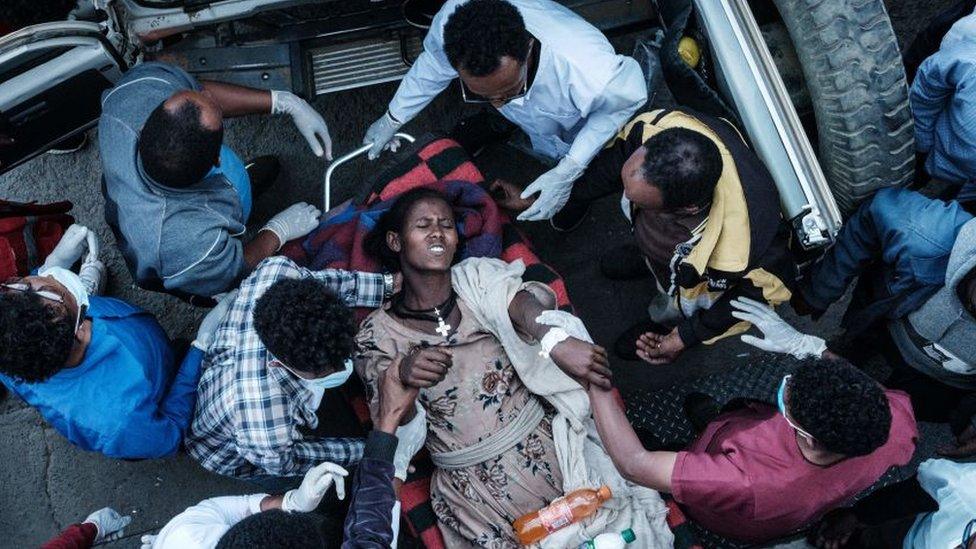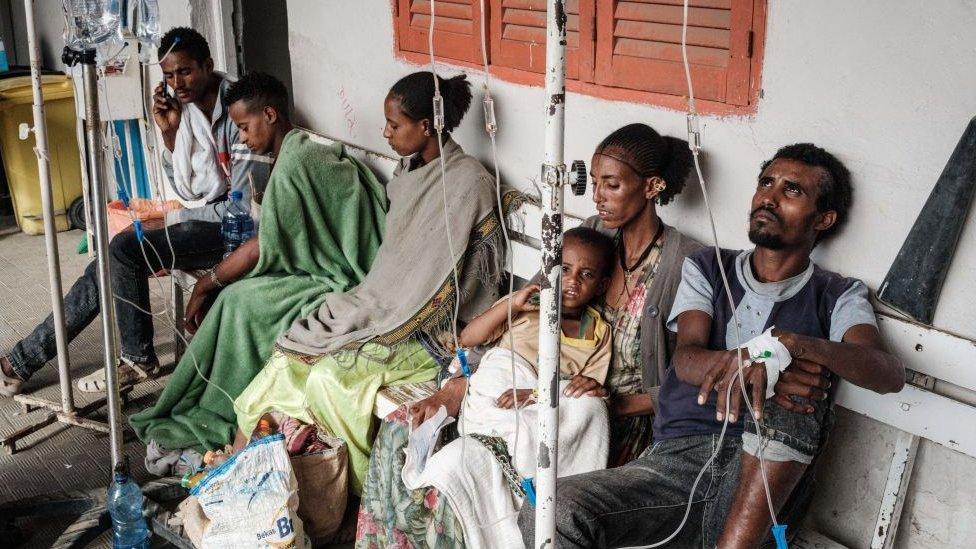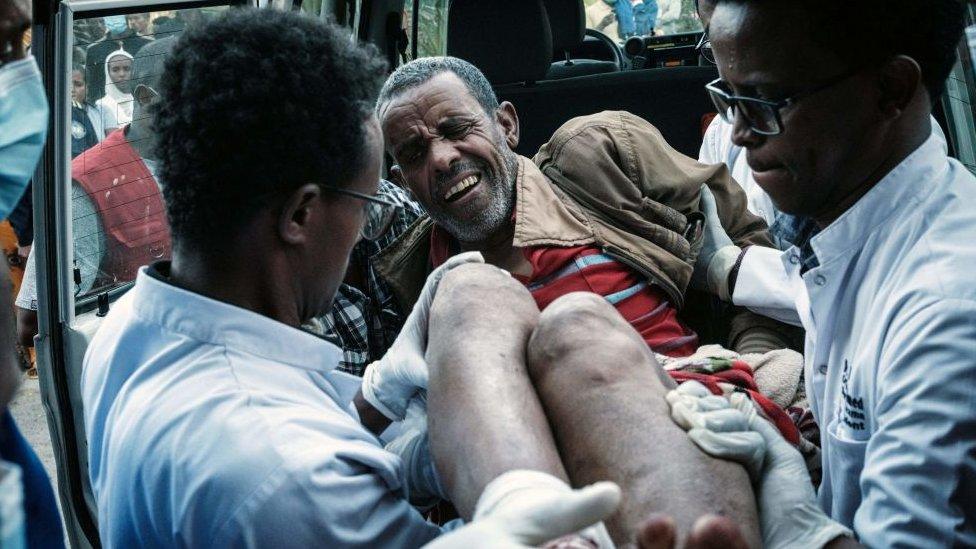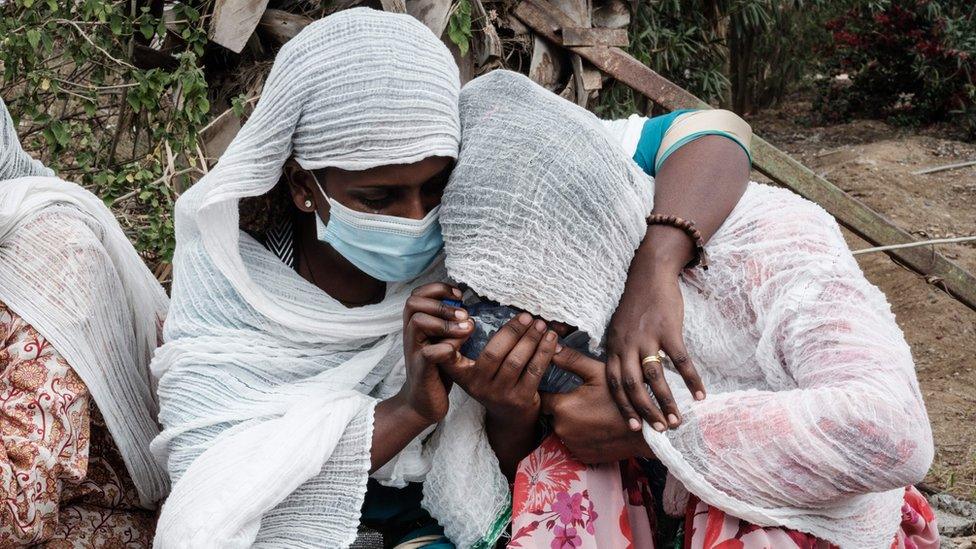Ethiopia's Tigray crisis: What happened the day a bomb hit a market
- Published

New satellite images show more clearly the damage caused by an Ethiopian missile strike on a market town in the northern region of Tigray.
Conflicting accounts have been circulating in the days following the incident on 22 June.
The Ethiopian government said it was targeting militants, but multiple sources have described heavy civilian casualties including women and children.
We've used witness accounts, aerial images and official statements to build a detailed picture of what happened.
How the attack unfolded
Shortly after 13:00 local time on 22 June, a teenage boy was playing a game at one of the shops at the market when he heard a loud bang.
"I rushed out and saw a lot of people lying on the ground injured," he told the BBC. "My leg was hurt as I ran to escape the area."
The blast had occurred in the market area of Togoga town - about 25km (15 miles) north-west of the region's capital, Mekelle.
Speaking to the BBC Tigrinya service, witnesses and victims have corroborated the time and describe a busy scene prior to the attack.
We've traced a social media post from Tigrayan opposition official Hailu Kebede referring to the incident at 13:37 local time.
Allow X content?
This article contains content provided by X. We ask for your permission before anything is loaded, as they may be using cookies and other technologies. You may want to read X’s cookie policy, external and privacy policy, external before accepting. To view this content choose ‘accept and continue’.
The market is an open area with traders selling goods, surrounded by grocery stores, beauty shops, tailors and coffee houses.
A young woman was shopping in the market when the missile struck.
She collapsed and remembers others falling to the ground around her.
These survivors of the attack had been able to get to a hospital in Mekelle from where they told their stories.

Togoga is a small market town 25km from the regional capital Mekelle
"The scene was horrific," a local bus driver told the BBC.
"Houses had collapsed and people had been buried under debris. It was difficult to pull out some of the people and bodies."
He had picked up 15 of the injured in his bus and set off on the road to Mekelle, but says he was turned back by army officials.
By the time he returned to Togoga, he says five of the victims had died.
A Tigrayan health official told the BBC they tried to send an ambulance, but were turned back on the road by people wearing Ethiopian army uniforms.
They had been ordered to get a letter of authorisation from the provisional administration.
When they returned with it, they were then ordered to get a further letter from the regional president, but this had proved impossible.
Other emergency workers have reported similar stories of obstruction to their movements.

Some of the injured were able to reach hospital in Mekelle
'The explosion was devastating'
Satellite images produced by Planet Labs on 27 June show extensive damage to the buildings in the northern part of the market.
You can see more clearly from these later images a number of structures with their roofs blown off.

Satellite images from 27 June show the extent of the damage
Tigray opposition official, Hailu Kebede told the BBC that locals had first heard the sound of a jet aircraft, followed a few seconds later by a loud explosion.
"The ground is rocky and so the explosion was devastating," he said.
"The northern part of the market was the one that was badly damaged, although at the southern part there was damage to the iron roofing."
"My friend's two children were casualties, one died and the other had her legs amputated," he says.
Togoga is also called Edagaselus, which means Tuesday Market (the day of the attack).
Mr Kebede says the market must have been very busy on that day, because it was just a week before the planting season in the region.
"You have farmers coming to buy seeds, and others to sell their wares and buy farm inputs. It is one of the most vibrant markets around Mekelle."

Medical assistance for the injured was hampered by roadblocks
What has the Ethiopian government said?
The BBC spoke to Colonel Getnet Adane of the Ethiopian army on Tuesday evening, the day of the attack.
At that time he categorically denied that a market had been struck by a missile.
"We never carried out an air strike on the market place. How is this possible? The army is capable of accurately hitting its targets," he said.
"We conducted air strikes, but only on certain targets. It is completely incorrect to claim that it was carried out at a market."
On the Thursday after the attack, Colonel Getnet told local journalists in the Ethiopian capital Addis Ababa that it was carried out on an armed Tigrayan opposition group observing Martyrs' Day.
He also said the air strike happened "after 15:00 when the market would have been over", although we know from witness testimony gathered by the BBC, and from social media posts, that the attack happened around 13:00 when the market was at its busiest.
Colonel Getnet also told the Reuters news agency that the army had struck combatants who were dressed in civilian clothes in Togoga, but that they were not inside the market.

There was extensive damage to buildings around the market
Were Tigray forces in the area?
We don't know the answer to this.
Access to the region for both emergency workers and local journalists has been severely restricted.
The government points out there is an ongoing conflict in the region and that Tigray forces have been active in the area.
Togoga lies on a route between Mekelle and the location of fierce recent clashes.
However, there is no way of knowing whether fighters were present in or near the town's market area on Tuesday.
The BBC has been told by witnesses that there were none present, but civilians in the area would be unlikely to disclose the presence of local fighters.
What is clear, however, is that among the dozens of casualties in the market area there were many civilians, among them women and children.
Reporting by Peter Mwai and Jack Goodman

Related topics
- Published23 June 2021
